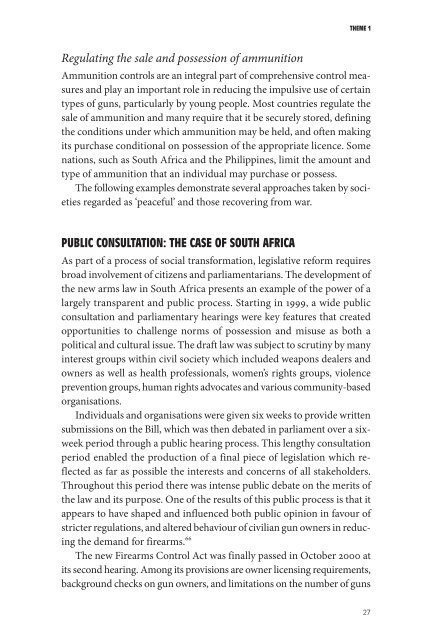MISSING PIECES - Inter-Parliamentary Union
MISSING PIECES - Inter-Parliamentary Union
MISSING PIECES - Inter-Parliamentary Union
Create successful ePaper yourself
Turn your PDF publications into a flip-book with our unique Google optimized e-Paper software.
THEME 1<br />
Regulating the sale and possession of ammunition<br />
Ammunition controls are an integral part of comprehensive control measures<br />
and play an important role in reducing the impulsive use of certain<br />
types of guns, particularly by young people. Most countries regulate the<br />
sale of ammunition and many require that it be securely stored, defining<br />
the conditions under which ammunition may be held, and often making<br />
its purchase conditional on possession of the appropriate licence. Some<br />
nations, such as South Africa and the Philippines, limit the amount and<br />
type of ammunition that an individual may purchase or possess.<br />
The following examples demonstrate several approaches taken by societies<br />
regarded as ‘peaceful’ and those recovering from war.<br />
PUBLIC CONSULTATION: THE CASE OF SOUTH AFRICA<br />
As part of a process of social transformation, legislative reform requires<br />
broad involvement of citizens and parliamentarians. The development of<br />
the new arms law in South Africa presents an example of the power of a<br />
largely transparent and public process. Starting in 1999, a wide public<br />
consultation and parliamentary hearings were key features that created<br />
opportunities to challenge norms of possession and misuse as both a<br />
political and cultural issue. The draft law was subject to scrutiny by many<br />
interest groups within civil society which included weapons dealers and<br />
owners as well as health professionals, women’s rights groups, violence<br />
prevention groups, human rights advocates and various community-based<br />
organisations.<br />
Individuals and organisations were given six weeks to provide written<br />
submissions on the Bill, which was then debated in parliament over a sixweek<br />
period through a public hearing process. This lengthy consultation<br />
period enabled the production of a final piece of legislation which reflected<br />
as far as possible the interests and concerns of all stakeholders.<br />
Throughout this period there was intense public debate on the merits of<br />
the law and its purpose. One of the results of this public process is that it<br />
appears to have shaped and influenced both public opinion in favour of<br />
stricter regulations, and altered behaviour of civilian gun owners in reducing<br />
the demand for firearms. 66<br />
The new Firearms Control Act was finally passed in October 2000 at<br />
its second hearing. Among its provisions are owner licensing requirements,<br />
background checks on gun owners, and limitations on the number of guns<br />
27
















